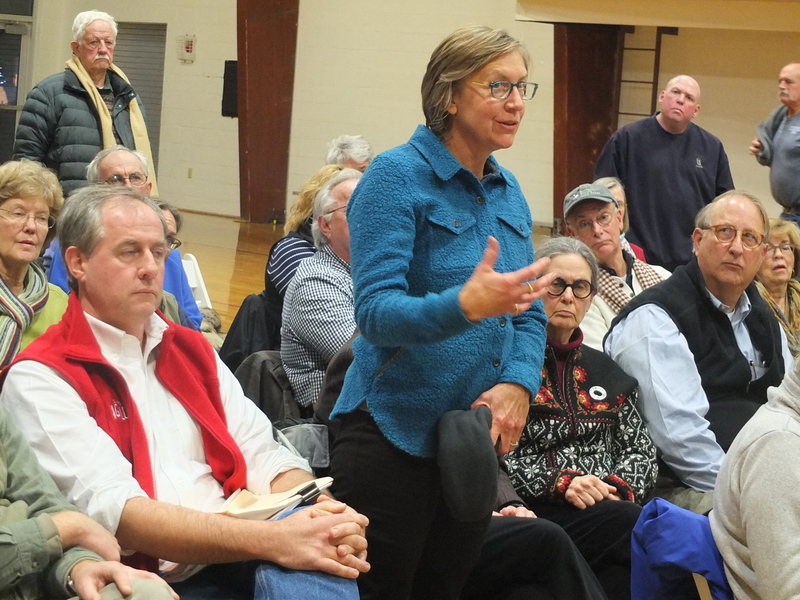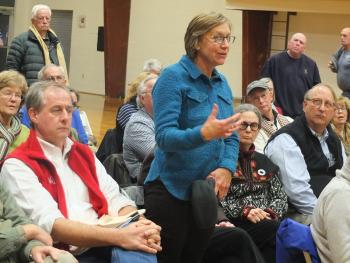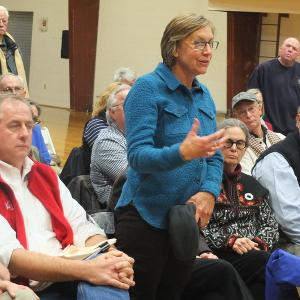Planning board approves Botanical Gardens’ permit
 Coastal Maine Botanical Gardens board member Paula Swetland of Edgecomb was one of approximately 70 people who attended the Dec. 15 Boothbay Planning Board meeting. The 4.5-hour meeting had CMBG expansion proponents and opponents discussing whether the planning board should approve the $30 million-plus first phase. In the end, the board unanimously approved the permit on a conditional basis. BILL PEARSON/Boothbay Register
Coastal Maine Botanical Gardens board member Paula Swetland of Edgecomb was one of approximately 70 people who attended the Dec. 15 Boothbay Planning Board meeting. The 4.5-hour meeting had CMBG expansion proponents and opponents discussing whether the planning board should approve the $30 million-plus first phase. In the end, the board unanimously approved the permit on a conditional basis. BILL PEARSON/Boothbay Register
 Coastal Maine Botanical Gardens board member Paula Swetland of Edgecomb was one of approximately 70 people who attended the Dec. 15 Boothbay Planning Board meeting. The 4.5-hour meeting had CMBG expansion proponents and opponents discussing whether the planning board should approve the $30 million-plus first phase. In the end, the board unanimously approved the permit on a conditional basis. BILL PEARSON/Boothbay Register
Coastal Maine Botanical Gardens board member Paula Swetland of Edgecomb was one of approximately 70 people who attended the Dec. 15 Boothbay Planning Board meeting. The 4.5-hour meeting had CMBG expansion proponents and opponents discussing whether the planning board should approve the $30 million-plus first phase. In the end, the board unanimously approved the permit on a conditional basis. BILL PEARSON/Boothbay Register
The question on everybody’s mind has finally been answered. The Boothbay Planning Board approved a permit Dec. 15 for Coastal Maine Botanical Gardens to begin the first phase of its $30 million-plus expansion project.
In October, CMBG applied for a permit to construct a new visitors center, gift shop, horticultural center, conservatory and additional gardens. The project is part of the Botanical Gardens’ 20-year master plan for accommodating a growth in visitors.
The expansion created considerable opposition from Vaughn and Joanne Anthony’s family whose farmhouse is the Botanical Gardens’ largest abutter. The Anthonys have lived at their Gaecklein Road residence since 1966. Their sons, Kevin and Jason, were the main spokesmen in the three planning board meetings on the permit. The brothers voiced concerns about increased traffic, noise and lights, all decreasing the quality of life for their parents.
The Anthonys believed the general residential zone they live in is not suited to the Botanical Gardens’ goal of attracting 300,000 visitors annually. The family is also concerned about environmental damage created by the expansion. The Anthonys joined other opponents concerned about storm water runoff and increased phosphorus runoff into Knickerbocker Lake.
During the public hearing, attorney Bill Harwood spoke regarding the Boothbay Region Water District’s concerns. The Water District is concerned about the expansion’s use of a leach field instead of connecting to public sewer and water. The district is troubled about doubling the number of Botanical Gardens parking spaces. Harwood explained protecting the region’s drinking water supply should concern everybody in attendance.
“This isn’t just any lake or pond in Maine,” Harwood said. “This is your source of your drinking water and it comes from Knickerbocker Lake. We can’t afford the luxury of being wrong. We can’t take a risk with something this important.”
Concern about increased phosphorus runoff into Knickerbocker Lake heightened after an environmental consultant hired by the planning board issued a peer review. FB Environmental Associates Project Manager Laura Diemer described an apparent weakness in the DEP report. She believed phosphorus runoff created by the expansion would be more than DEP reported.
During the public hearing, she affirmed that conclusion by stating, “In granting the Botanical Gardens a permit, the DEP calculated only surface runoff, and didn’t calculate phosphorus contamination from groundwater or a leach field.” Diemer concluded the expansion would likely result in more phosphorus entering Knickerbocker Lake than 1.87 pounds per year.
The Botanical Gardens consultant, Jan Wiegman of Wright-Pierce Engineering, reported the DEP calculated expansion-created phosphorus runoff at 1.17 pounds per year. The figure is below the allowable 1.87 mark which environmentalists calculate as being an acceptable level. Wegner also clarified Diemer’s assertion.
“She is not saying the DEP is wrong, only that she preferred using a different system,” he said. “The DEP established regulations for environmental law, and we followed the law as it was written.”
After the two and a half hour public hearing, the planning board spent another hour discussing the material and asking Wiegman more questions about the septic system. The board took another hour going over the 18 pages of facting-finding before approving the permit.
CMBG Executive Director Bill Cullina expects the expansion project to begin after receiving the final approval from the board of directors and the proposal conforms to the conditions placed by the planning board. The expansion is expected to begin in early 2017.
Cullina expected opponents to voice significant opposition during the public hearing. But he expected planning board approval because the proposal met all the requirements mandated by the DEP and town ordinances.
“I wasn’t surprised because of all the talk leading up to the vote,” he said. “Tonight, we tried to get across we’re doing everything to be good citizens in the watershed by limited development. We’ve spent a lot of money for storm water remediation, which hopefully can become a model for others.”
Last month, the Anthonys appealed the Botanical Gardens’ DEP permit. If the appeal is successful, it would impact the town’s approval, according to Planning Board Chairman Alan Bellows. The family is also considering appealing the planning board’s decision.
Kevin Anthony disagreed with the board’s conclusion. He believed the board failed to follow the law. One law Anthony believed the board didn’t follow was Maine’s Subsurface Wastewater Disposal Rules.
“Based upon my cursory knowledge of the law, the facts weren’t considered. I think a lawyer needs to look at those rules. They seem pretty cut and dried,” he said.
The Anthonys hired Brunswick environmental lawyer Sarah McDaniel to appeal the DEP permit. They may also use her to appeal the planning board’s decision, according to Kevin Anthony.
Event Date
Address
United States























